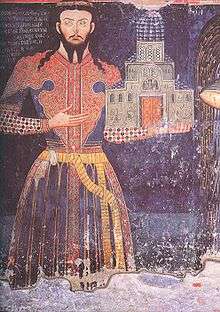Jovan Oliver
Jovan Oliver Grčinić (Serbian: Јован Оливер Грчинић; ca. 1310-1356) was a magnate of the Serbian Emperor Dušan the Mighty (r. 1331-1355), holding the titles of sebastokrator and despotes, and the rank of "great voivode", showing his prominence and status as one of the most important nobles of Dušan. Oliver supported Dušan in the succession war against his father, and was one of the supreme generals in the southern military expeditions (Macedonia, Thessaly). His province included Ovče Pole and the left bank of the Vardar. After the death of Emperor Dušan, there are no more mentions of Oliver. During the fall of the Serbian Empire, his lands were held by the Dejanovići.
Jovan Oliver Grčinić | |
|---|---|
 Jovan Oliver, fresco from the Lesnovo monastery. | |
| Reign | Lord of Ovče Pole and the left bank of the Vardar |
| Full name
Jovan Oliver Grčinić (Јован Оливер Грчинић) | |
| Titles and styles | |
| Born | ca. 1310 |
| Died | ca. 1356 |
| Wife | Karavida (†1336) Maria Palaiologina |
| Issue
see family | |
| Father | vlastelin Grčin |
| Religion | Orthodox Christianity |
Life
Jovan was the son a vlastelin Grčin (Грчин, "Greek") who had lands in some part of the Serbian Kingdom.
Jovan is referred to in a Ragusan source as Oliver Grčinić, and his knowledge of Greek lends support to the notion of a Greek origin.[1] He ruled his domain, in modern-day North Macedonia, as a semi-independent prince, acknowledging Dušan's suzerainty but not subordinate to him.[1] He probably had supported Dušan's overthrow of his father, King Uroš III, in 1331, and after the death of his first wife, Karavida, in 1336, he married Maria Palaiologina, Dušan's stepmother. There is considerable scholarly debate as to when Jovan Oliver acquired his domains, i.e. whether he held them before Dušan's accession, whether they were granted to him by Dušan as a reward for his support, or whether he gained them as a result of his marriage to Maria.[2]
At any rate, he was one of the most powerful nobles under Dušan, and exercised considerable influence over him, as evidenced in the negotiations in July 1342 which led to the decision to support John VI Kantakouzenos in the Byzantine civil war of 1341–1347, in exchange for which he hoped to marry his daughter to Manuel Kantakouzenos.[3] He was also active in the 1334 war with the Byzantine Empire, and was present during the subsequent peace negotiations together with Vratko Nemanjić, when Jovan was probably named despotes by Andronikos III Palaiologos.[2] With the death of Hrelja in late 1342, when the latter's domain was split between Jovan Oliver and Dušan, he was able to further expand his lands, including the important towns of Štip and Strumica.[4]
In 1341, imitating the Serbian kings, he built the Eastern Orthodox Lesnovo monastery as his endowment.[4] Jovan Oliver outlived Dušan, but after his death, his sons were unable to assert themselves: possibly opposed by a coalition of other nobles, they failed to acquire any positions of importance, and most of their father's lands were taken over by Constantine and John, the sons of sebastokrator Dejan Dragaš of Kumanovo.[5]
Family
He had 7 children:
- Danica
- Krajko (or Krajmir)
- Damnjan (or Damjan)
- Vidoslav
- Dabiživ
- Rusin
- Oliver
| Court offices | ||
|---|---|---|
| First | despot of Stefan Dušan 1346–? Served alongside: Simeon Uroš and Jovan Asen |
Succeeded by Dejan as despot of Uroš V |
| First | sevastokrator of Stefan Dušan before 1346 |
Succeeded by Dejan and Branko |
| Preceded by Gradislav Vojšić as čelnik |
veliki čelnik of Stefan Dušan before 1340–before 1349 |
Succeeded by Dimitrije |
| Military offices | ||
| Vacant Title last held by Novak Grebostrek |
veliki vojvoda of Stefan Dušan fl. 1341–1355 Served alongside: Nikola Stanjević |
Succeeded by Jovan Uglješa as veliki vojvoda of Uroš V |
References
Sources
- Fine, John Van Antwerp (1994), The Late Medieval Balkans: A Critical Survey from the Late Twelfth Century to the Ottoman Conquest, University of Michigan Press, ISBN 978-0-472-08260-5
- Pirivatrić Srđan (2013). "The Byzantine titles of Jovan Oliver: A contribution to the issues of their origin and chronology". Zbornik radova Vizantološkog instituta. 50 (2): 713–724.
| Wikimedia Commons has media related to Jovan Oliver. |